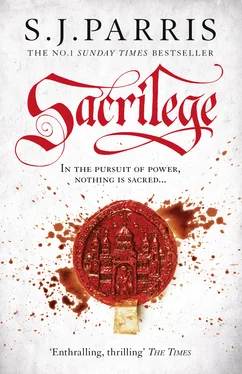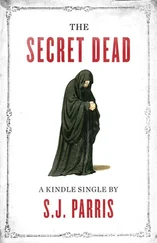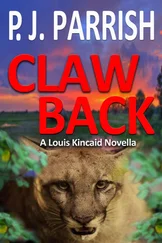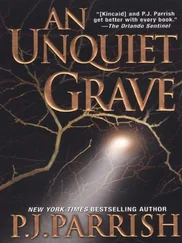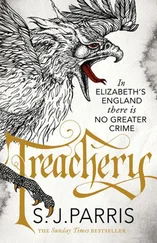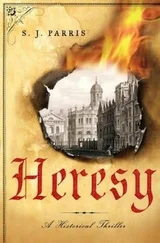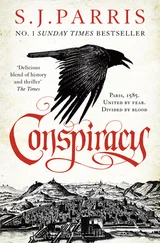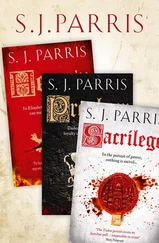‘Listen, Bruno …’ He yawned, stretched his long limbs, and fixed me with an earnest look. ‘It would do you good to get out of London. God knows, I feel the need for it myself. But you have been confined to the embassy for a year, spending all your time with that book of yours. I don’t like to see you brooding so much.’
‘I prefer to call it “thinking”,’ I said. ‘I am a philosopher, after all.’
‘Call it what you will, I think you could do with a bit of adventure in every sense. You need to live a little.’ He gave a crude thrust of his hips and winked.
‘I had my share of adventure during my first six months in England. I cheated death more than once. Besides,’ I added, ‘I am not the one idling around the house growing fat while my wife embroiders my shirts.’
He jumped to his feet and I thought he would feign a punch in my direction, but instead he looked down at himself in alarm, both hands laid flat across his stomach.
‘Oh, God, you speak the truth, Bruno. I am grown soft.’ He appeared so stricken that I had to smile.
‘I was only baiting you. But you are happy?’
He glanced at the door, then gave a half-shrug. ‘I have an eighteen-year-old wife and my debts are settled. What man would not be happy?’ But there was an edge to his voice that I could not miss.
‘And yet you want to go to war?’
‘And yet, yes, it seems I have this inexplicable longing to torment the Spanish. I just want to be doing something, Bruno, you understand?’ He clenched and unclenched his fists and after a moment’s silence produced a tight laugh. ‘But I had better not go to war until I have got myself an heir, had I? Just in case. And there seems no sign of that, despite my best efforts. Anyway,’ he sat down again, patted his belly and forced a lightness into his tone, ‘we were not talking about me. You should get yourself a woman, Bruno, you spend too much time alone. I see how your face changes when you talk about the Rector’s daughter – no, don’t deny it. She matters to you. You’ve saved her life once already, at the risk of your own.’
‘Then I abandoned her to a fate she didn’t deserve.’
‘Well then, don’t make the same mistake twice,’ he said, matter-of-factly. ‘I will work on Walsingham. But be prepared to find yourself hunting for the corpse of a dead saint as well as a murderer.’
‘Since I seem to have a knack of stumbling over corpses wherever I turn, perhaps I am the man for the job,’ I said. But again the similarity between Sophia’s words and Sidney’s pricked at my thoughts, and I pictured the dead man’s brains spilling out of his shattered skull across the worn flagstones.
I hoped Sidney’s optimism was well founded. Their story about the secret cult of Saint Thomas had piqued my interest in the city of Canterbury yet further, but above all I wanted to visit Sophia at the tavern that evening with good news, to see the colour in her face and hope in her eyes. Two impossible tasks – to find a dead saint and a living murderer – but, as Sidney said, it was better than sitting idle, waiting for fate to unfold its design around you.
CANTERBURY
The road out of London towards Kent, known as Watling Street, was still busy with traders and drovers, though the traffic of pilgrims had long since stopped. We set out early, but weeks without rain had baked the unpaved track hard as stone and before we had even reached Southwark my eyes and throat were stinging from the clouds of dust flung up by hooves and cartwheels. Every traveller we passed wore a cloth tied around his or her mouth and nose, and I resolved to buy something similar in whichever town we came to next.
Sophia rode beside me, the peak of her cap pulled low over her face. She had barely spoken since we set out and, though I could see little of her expression, the tense line of her jaw betrayed her anxiety at the journey we were now undertaking. Perhaps, after pinning so much hope on its outcome, she had finally begun to appreciate the grave danger she would face when she rode back through the gates of the city that wanted her arrested for murder. Now and again she would clear her throat and I would turn expectantly, waiting for her to speak, but she would only smile wearily and indicate the dust.
I had hired two strong horses at considerable expense, paid for partly out of the purse Walsingham had sent to cover my stay in Canterbury. Eventually he had relented, according to the messenger who had been waiting for me in the street outside the embassy with an encrypted letter two days after my visit to Barn Elms. In it Walsingham had included a fully stamped travel licence, without which I would risk arrest for vagrancy, and instructions that I was not to travel under my own name, nor was I to reveal it under any circumstances to anyone in Canterbury except Harry Robinson.
My host, the French Ambassador, had been reluctant to let me go, but he acknowledged that he had no power to forbid me from travelling, since I did so (he believed) at his sovereign’s expense. He bade me farewell with genuine affection and regret in the midst of his own arrangements for moving the embassy household to the countryside, and I felt a pang of sadness at leaving, though it was outweighed by the delight on Sophia’s face as she flung her arms around my neck when I told her the news.
Now she was riding at my side as the sun climbed higher into a sky of untouched blue and the road stretched out before us, and I could not suppress a swelling sense of anticipation. Sophia’s future depended on the outcome of this journey; if I could clear her of the charges of murder, I could also clear my own conscience of the guilt that had hung heavy on any thought of her since the events in Oxford. Freed of these burdens, might we not begin again, as if on a fresh page?
There was also the prospect, after almost a year spent at a desk buried in books and astronomical charts, of proving my worth again to Walsingham and the Queen. The goodwill of princes was fickle, as every courtier knew, and an ambassador could be recalled or expelled at a moment’s notice. I was certain that my own best prospects, if I wanted to go on writing my books without fear of the Inquisition, lay at the court of England, not France, but to ensure myself a future there I needed Walsingham to value me for my own skills and not merely for my useful connection to the French embassy.
Sophia’s horse gave an impatient little whinny and tossed its mane, making her start in the saddle. I turned, but she recovered her poise and purposefully ignored my expression of concern, her eyes fixed on the road. She rode competently enough, though she looked uncomfortable astride the horse, her long legs pressed tightly against its sides. I tried not to dwell on this thought. She was unused to riding like a man, I supposed, and the stiffness of her posture in the saddle could give her away. One more small trap to avoid, if her boy’s disguise were to hold up. I concentrated my gaze again on the tips of my horse’s ears. There would be danger in this for both of us; I was not so caught up in dreams of adventure as to pretend otherwise. If Sophia was recognised within the city walls of Canterbury, she would be arrested to await trial for her husband’s murder, and if my search for the evidence to vindicate her did not succeed before the assizes, she would face certain execution. There were other dangers too; if the real killer was still in the city and thought he had escaped blame, he would not thank a stranger for asking awkward questions. Anyone who could strike a man down with such force that his brains spilled over the ground would surely not hesitate to dispatch those who seemed overly curious. And as for the legend of Becket’s corpse, I could not help but remember that my last attempt to infiltrate the underground Catholic resistance had very nearly ended fatally.
Читать дальше
